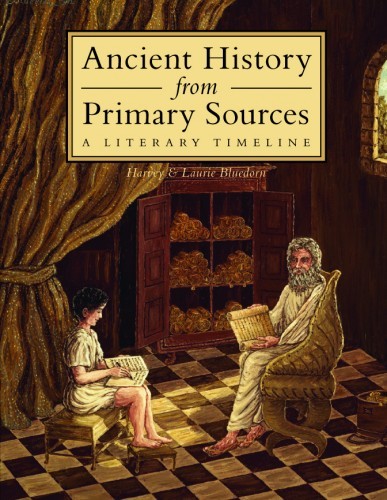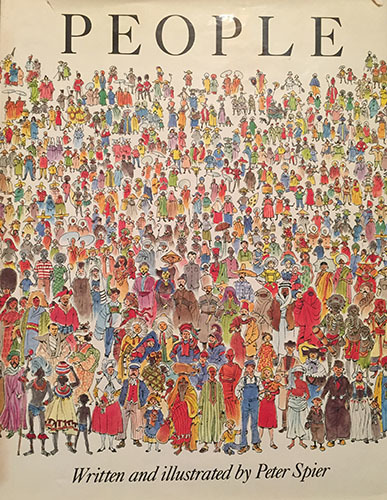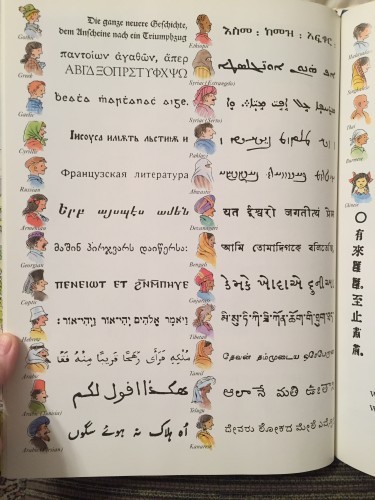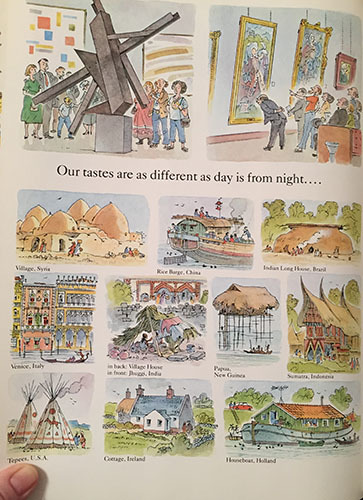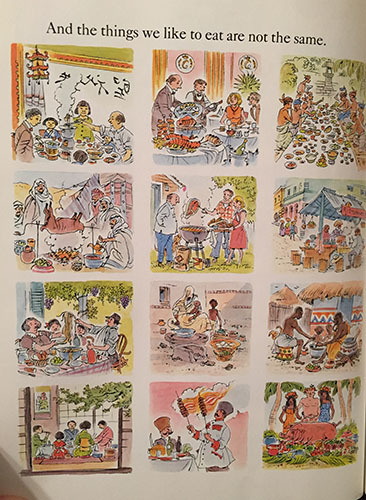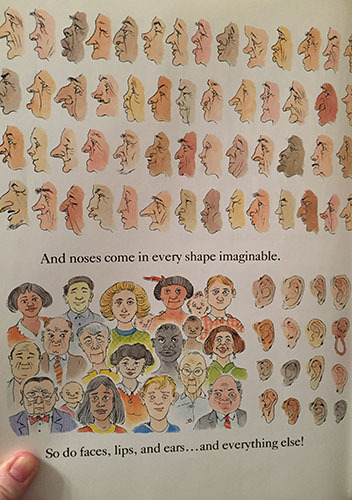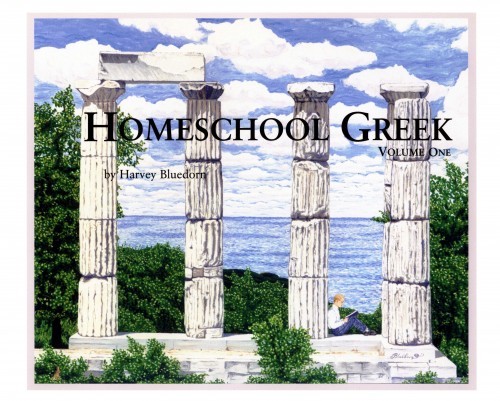Laurie Bluedorn's Blog, page 6
September 28, 2019
Ancient History from Primary Sources: A Literary Timeline — Free October 2-3
Ancient History from Primary Sources: A Literary Timeline
by Harvey and Laurie Bluedorn
This illustrated reference book guides the student on a selective timeline tour through ancient history, outlining the major events and personalities and noting the primary literary sources from which these things are known. Covers the period from the creation of the world to A.D. 476. Each event or person in history is accompanied by suggested readings from various ancient sources, leading you through the maze of ancient literature. The classical literature we cite is suitable for students ages twelve and up — some suitable for younger students. 222 pages
The Kindle version is FREE for 2 days — October 2-3.
Download your free copy here.
Here is the special offer:
On October 2-3 (these two days only) the Kindle version of Ancient History from Primary Sources: A Literary Timeline will be free. In addition, if you download the Kindle version sometime during the two day period and write an Amazon review, we’ll send you one of the following ebooks from the Trivium Pursuit catalog (in PDF format). You can choose one of these six ebooks:
Ancient Literature — Significant Excerpts From the Books of Classical Authors Which You Can Use to Supplement Your History Curriculum
Volume One — Julius Caesar
Volume Two — Alexander the Great
Volume Three — Augustus, Jesus Christ, and Tiberius
Volume Four — Ancient Egypt
Volume Five — Caligula, Claudius, and Paul
Volume Six — Nero, Paul, and the Destruction of Jerusalem
HOW TO CLAIM YOUR FREE EBOOK FROM THE LIST ABOVE:
After you download Ancient History from Primary Sources: A Literary Timeline and post your review on Amazon here, send an email to bluedorn @ triviumpursuit.com with the title of the ebook you would like.
September 10, 2019
My child is gifted
I’m just now preparing to begin homeschooling my oldest child, who turned five in January. I’m intending to follow a classical model. I’ve just recently found your website and I’ve read your articles on early formal education.
My daughter is, in your terms, a precocious little tyke, who taught herself to read at age 3-1/2. She now reads chapter books, does basic math calculations in her head, and comfortably uses words like represents, imagination, paleontologist, capillary, etc. We read a wide variety of books and discuss diverse subjects. She attends a Montessori preschool, and we have been doing informal, concrete math at home for a long time. I ordered Saxon Math 1 in preparation for the fall. She saw the workbook and asked if we could start right away. She loves her lessons, especially the worksheets. She works quickly and almost never makes a mistake. So I think, again as you say, perhaps I would be mistaken to hold her back.
Here is my question: When a young child is very advanced for his age, what should guide a parent’s decision as to how quickly to move through material? I mean, if he can handle algebra at age 8 and wants to do it, does that mean it should be introduced? On the one hand, I hardly see the point of teaching algebra to a child that young. On the other, don’t we want to keep the child excited about learning and feed that voracious desire for new horizons?
I have done some reading on gifted education, but I have not found satisfactory information on how to manage the very young child, i.e. discerning developmental readiness, and balancing that against the child’s relentless drive to learn.
Thank you in advance for your consideration of my question.
Susan
Whether we have intellectually slow, average, or gifted children, one of the keys is to achieve the best balance. If we focus on what is needed by the child, instead of upon feeding the child’s particular appetite for a particular thing — or lack thereof, then we will achieve a better balance.
For example, let us say we have a child who is somehow a mathematical genius, able to handle algebra at age eight. Does that mean he shouldn’t learn to play cowboys with his older brothers? Does that mean he shouldn’t do his chores of folding and putting away the laundry, washing the dishes, and vacuuming the floors. In other words, should other things be put aside in order that he can pursue his algebra? Of course not. His talent in algebra may prove a curse to him if he learns to think of it as putting him above other ordinary obligations in life.
Likewise, let’s say we have a child who is advanced in verbal skills. He can talk your ears off with an excellent vocabulary, excellent articulation, and a wide range of understanding. But he’s only six years old. The last thing you want him to do is to use that talent to take control of both his and your life.
True talents are actually extra burdens which the Lord places upon some persons – burdens which, if they learn to handle them properly, can be the source of great happiness in achieving godly aims, but if they are not handled properly, can be the source of great sorrow and frustration.
So balance does not come from feeding appetites. A balanced diet is not one which satisfies my constant craving for ice cream and chocolate. Balance comes from training appetites.
Of course, the analogy begins to break down here. We are not saying do not allow a talent to advance – like you wouldn’t let someone continually gorge himself on ice cream and chocolate like a glutton. But you must have an eye of discernment as to what is actually the nature of the talent, how best can it be advanced, and an eye which is not distracted by the talent from other important things.
My boy has a talent for playing soccer, therefore I’m quitting homeschooling and putting him in public school where he can get better training and be better challenged. Bad choice. A whole parcel of other things should take precedence over your boy’s “talent.”
My girl has artistic talent. I’m cutting back on the Greek and Logic and other things so that she can take lots of special lessons and go to art shows, and the like. Bad choice. With such attention, your girl is likely to get a big head about her talent, as if it should take precedence over other important things she should learn, and other important parts of life. Then her talent will not serve her well.
Above all, the child must learn to serve others, not themselves, with their talents. If you have a child with a talent for languages, then find ways he can help others which do not have this natural gift. He could teach others or help others to learn that language, or help others who don’t know English to learn it. Pray that the Lord open up specific opportunities to use the natural as well as the spiritual talents which you, your child, and your family have to build His Kingdom.
And, of course, the parent is in the best position to see how to balance all of these things. One family will need to draw the line in a different place than the next family.
Harvey
Ten Things to Do from Birth to Age Five — An Addendum to Ten Things to Do Before Age Ten
Elsewhere we have written about the Ten Things to Do Before Age Ten — ten areas of life we think are important to concentrate on with your children before they turn ten. The following is a subset of the above list of ten things — ten things to do from birth to age five (or so).
Focusing in on these early years, here are ten things to do from birth to age five (or so).
1. Develop listening and learning.
Read aloud to your child — work up to a couple hours per day. Use audio books often. Vocabulary is the primary index of intelligence, and regular reading aloud to your children from good literature for at least two hours per day will widen their vocabulary and their conception of the world. In addition, this will prepare your child for learning to read and spell.
2. Develop playing and exploring.
Give your child plenty of free play time. This will help develop their elementary creativity.
3. Develop an inner library of sensory experiences: seeing, hearing, touching, tasting, smelling — aka, keep your child away from screens (television, computer)
4. Get out of the house — this is an extension of #2.
Spend lots of time outdoors — work up to two hours per day. This will help develop their elementary creativity. Visit the FaceBook group and page 1000 Hours Outside.
5. Develop a sense of self-worth and accomplishment.
Help your child learn to assist you with chores around the house, taking care of animals, gardening. Communicate to them that they are needed.
6. Expand the dimensions of experience.
Expose your child to a wide variety of experiences — experiences from which to build her understanding of the world. Field trips, exposure to music, exposure to other languages, familiarity with the library.
7. The early years are formative in the way of establishing good habits and attitudes. Start the process of helping your child to develop good habits, which might include manners and courtesy. Good attitudes might include respect for parents and siblings.
8. Establish an awareness of God.
From the very start, include your child in your family worship.
9. Develop an inner library of good and guiding examples.
Around age two or so, you can start to help your child to learn how to memorize Bible verses, poetry, prayers, or whatever it is that is important to you to memorize. This will prepare your child for learning to read and spell.
10. Very young children learn more through their senses. They need more hands on manipulatives before age five. Give them plenty of time to experiment with art and crafts and thereby develop their elementary creativity. Learning to hold a crayon or pencil will prepare them for handwriting.
This is when your child develops a physical, mental, and spiritual appetite. We won’t develop an appetite for good food by feasting on junk food – and we carry that analogy over to all of life. This is the time to sow the seeds of honoring God and parents, developing the capacity for language and the appetite for learning, enriching the memory, and instilling a work and service ethic. This is the time to lay the foundation for the formal academics which will follow. We want to pay attention to developmental principles. Balance does not come from feeding appetites. A balanced diet is not one which satisfies my constant craving for ice cream and chocolate. Balance comes from training appetites. From birth to age five (or so) is the most important because it develops an appetite or love for learning in the child. It is here he develops an inquiring mind. We are giving our students the basic tools, which they need for self-education. You should focus on building a good foundation for later academics. You want to develop in them an appetite for learning.
Around age five (or so), then the things we wrote about in Chapter 11 of our book, Teaching the Trivium: Christian Homeschooling in a Classical Style, will become important.
Possible practical application from the above ten things to do from birth to age five:
You don’t need to buy a curriculum or workbooks. Just live life. Children are learning through the experiences you share with them.
Life is your curriculum.
Is a PE class necessary in your homeschool?
What curriculum is available now for physical education for a 7-year-old? We are doing a PE class but not loving it or really seeing the benefit. Advice? Thanks!
I think the most important thing to teach a young child in the area of PE is to help them learn to love to get exercise. Lots of play outside. I always recommend two hours a day of play outside. All kinds of exercise: bike, running, sports, etc. It doesn’t need to be in the form of a “class.” Make it just a part of daily life. Just like you always eat breakfast. You always get exercise outside.
John MacArthur — God Won’t Let You Go
Since I spend a lot of time on the couch lately, I often listen to sermons and radio broadcasts. This series by John MacArthur has been a great blessing to me this week, and I thought you might like it too.
Perseverance of the Saints, Part 3
Friday, March 1, 2019
Concerned that I have missed doing the grammar stage properly with my two oldest sons
This is my 3rd year homeschooling my sons. They are in 2nd, 5th, and 6th grades. I have been slowly trying to incorporate some of the principles of classical education into our homeschool effort. For example, we have begun the study of Latin this year. I am increasingly concerned that I have missed doing the grammar stage properly with my two oldest sons. Is there any way to assess gaps they might have, and catch up? –E.C.
I’ve heard people discuss this topic, but could never quite understand what people meant by gaps. Do they mean that they are worried because their children didn’t study rocks in the 3rd grade like most public school children do, or that they didn’t study the planets in 4th grade? We’re talking here about children not learning the facts in a certain area of study by a certain age level. I think lots of people worry about this. One person I once talked to was quite concerned because her ten-year-old child knew nothing about the Depression of the ’30’s, and another mother felt like a failure because her son couldn’t recite all the states and capitals by age twelve. These types of worries could drive parents crazy, especially if they stop and think about all the minute facts their child probably doesn’t know, and the even greater number of facts he learned but immediately forgot.
Now, I have a confession to make. We never studied rocks. Never. In fact, we never studied earth science at all. But that’s OK, because I plan on studying the subject with my grandchildren when I have more time. I’m actually looking forward to it.
Classical education is not like the education we parents got in the public school, where we memorized a bunch of facts, took a test, and then went on to the next subject. Classical education is about training minds and developing proper appetites. It’s developing the imagination and creativity. It’s having time to play and explore in the old fashioned way. It’s encouraging a love for learning. It’s building a firm foundation in the child’s mind with memorization and narration. And it’s about learning to obey and serve our heavenly Father. It’s a way of life.
But perhaps the gaps you are worried about are the skill type gaps and foundational knowledge that are important to learn in the early years — things such as basic formal English (and other language) grammar knowledge which could be started at age ten; the basics of formal mathematics which also could begin at age ten (and informal math at earlier ages); and intensive phonics instruction which should begin as soon as the child is ready. These all are foundational stones to the building you are constructing, and any gaps here would need to be repaired.
All the various dealings of God with His children, do by a special providence turn to their good
Excerpt from A Divine Cordial by Thomas Watson
“…The excellency of the privilege, “All things work together for good.”
This is as Jacob’s staff in the hand of faith, with which we may walk cheerfully to the mount of God. What will satisfy or make us content, if this will not? All things work together for good. This expression “work together” refers to medicine. Several poisonous ingredients put together, being tempered by the skill of the apothecary, make a sovereign medicine, and work together for the good of the patient. So all God’s providences being divinely tempered and sanctified, do work together for the best to the saints. He who loves God and is called according to His purpose, may rest assured that every thing in the world shall be for his good. This is a Christian’s cordial, which may warm him — make him like Jonathan who, when he had tasted the honey at the end of the rod, “his eyes were enlightened” (I Sam. xiv. 27). Why should a Christian destroy himself? Why should he kill himself with care, when all things shall sweetly concur, yea, conspire for his good? The result of the text is this. All the various dealings of God with His children, do by a special providence turn to their good. “All the paths of the Lord are mercy and truth unto such as keep his covenant” (Psalm xxv. 10). If every path has mercy in it, then it works for good….”
Choose four Trivium Pursuit books if you order the Ron Paul Homeschool Curriculum
On our Trivium Pursuit web site we talk about what classical education is and how we can implement it in our homeschool. The Ron Paul Curriculum is compatible with our book Teaching the Trivium: Christian Homeschooling in a Classical Style. In addition, the RPC is self-teaching, which would be helpful in a situation where both parents must work, but a family can use it as they wish — participating with the children by learning along with them or allowing the children to learn independently.
If any of your children have college in their future, the RPC can be especially helpful. By taking AP (Advanced Placement) exams and CLEP (College Level Examination Placement) tests, a student can receive college credit and can reduce the cost of the first two years of college. The RPC encourages students to participate in these two programs.
Plus, you will receive four free Trivium Pursuit books if you buy the curriculum using our link.
Choose four of the following:
Ancient History from Primary Sources: A Literary Timeline
Teaching the Trivium: Christian Homeschooling in a Classical Style
Handy English Encoder Decoder
A Greek Alphabetarion: A Primer for Teaching How to Read, Write & Pronounce Ancient & Biblical Greek
A Greek Hupogrammon: A Beginner’s Copybook for the Greek Alphabet with Pronunciations
What Do You See? A Child’s First Introduction to Art, Volume One, Two, and Three
Little Bitty Baby Learns Hebrew
Ancient Literature — 6 Volumes
Bless the Lord: The 103rd Psalm
Little Bitty Baby Learn Greek
My Mommy, My Teacher
The Lord Builds the House: The 127th Psalm
U.S. addresses only, please.
Post may contain affiliate links to materials I recommend. Read my full disclosure statement.
August 28, 2019
Peter Spier and People
[image error] [image error]
You’re probably familiar with children’s writer/illustrator Peter Spier from his book Noah’s Ark[image error]. In fact, if you’re like me and look up Spier on Amazon, you’ll find several books you feel compelled to buy!
[image error]
[image error]
The Star-Spangled Banner
[image error]
[image error]
[image error]
We the People: The Constitution of the United States
[image error]
[image error]
[image error]
The Erie Canal
[image error]
But the book I’m most impressed with, and only just recently found at a garage sale, is People[image error]. It’s full title is People: A Picture Book for All Ages. Using detailed, colorful illustrations, Spier takes us on a trip around the world showing us how people come in all shapes and sizes, have different tastes, celebrate different things, eat different foods and play different games. Each person is unique and we need to respect each other. Your children will love hearing the various names for similar things around the world.
Only one criticism — I had to use a colored pencil to draw clothes on a couple of the people. No problem.
Post may contain affiliate links to materials I recommend. Read my full disclosure statement.
August 25, 2019
August 28-29 Homeschool Self-Study Greek Textbook will be free on Amazon Kindle
For two days only, August 28-29, the Homeschool Self-Study Greek Textbook (only the textbook, not the other three components of the curriculum) will be free on Amazon Kindle.
Homeschool Self-Study Greek: A Thorough Self-Teaching Grammar of Biblical Greek by Harvey Bluedorn is like no other Biblical Greek grammar.
Not only is Homeschool Greek self-teaching, but it is thorough. Students, both young and old, can teach themselves Greek in homeschool, in private school, or as a preparation for seminary or college.
Features include:
1. For ages 13 through adult — unlike other grammars, this is designed for younger students.
2. Teaches English grammar before it introduces Greek grammar.
3. Self-teaching — you do not need a teacher; the text is your teacher; the text continually asks questions and confirms or corrects your answers.
4. Programmed — the text takes us through the normal trivium process of learning.
5. Extensive preprinted Vocabulary Drill Cards.
6. A Greek New Testament Reader which covers Matthew 5-7, including an English translation.
7. Audio pronunciation files for both the textbook and the reader.
8. Diagnostic tests to determine whether the material has been mastered, and if not, what material to restudy.
Volume One has 18 chapters divided into 95 lessons and 15 comprehensive tests. The material begins very easy, gradually increases in difficulty, and concludes with five challenging chapters. The last 10 chapters use Biblical expressions for examples and exercises. The student must memorize numerous Greek passages from the Proverbs and the New Testament. The text points out information which the student is required to enter in an orderly Greek notebook. After completing Volume One, the student should have a working knowledge of Greek nouns, pronouns, adjectives, and prepositions and some knowledge of the Greek verb system. Younger students will take up to two years to complete Volume One. Adult students may be able to complete it in a few months.
There are four components to Homeschool Self-Study Greek: A Thorough Self-teaching Grammar of Biblical Greek:
1. Homeschool Self-Study Greek: A Thorough Self-teaching Grammar of Biblical Greek Textbook (304 pages)
2. Homeschool Self-Study Greek New Testament Reader (58 pages)
3. Homeschool Self-Study Greek Diagnostic Tests (28 pages)
4. Homeschool Self-Study Greek Vocabulary Drill Cards
Audio pronunciation files for both the Textbook and the Reader are found here.
For two days only, August 28-29, the Textbook (only the Textbook, not the other three components of the curriculum) will be free on Amazon Kindle.
If you prefer to buy the print version of all four components of Homeschool Self-Study Greek, go here.

